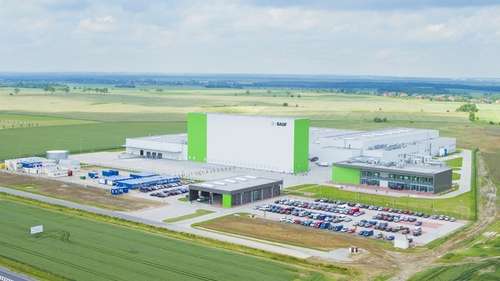
BASF is investing in the expansion of its mobile emissions catalysts production site in Poland. The expansion will include new production lines and additional infrastructure to equip vehicles with BASF's catalyst and filter solutions. The investment will increase the production site by 14,000 square meters and create new jobs. The expansion will enable BASF's customers to meet emissions standards for diesel and gasoline engines, such as Euro 6d. The expansion will also include state-of-the-art lines with a range of catalysts and filter technologies, including SCR.2F, LNT, and FWC.
BASF invests in the expansion of its mobile emissions catalysts production site in Ṥroda Ṥląska, Poland. The expansion includes new production lines and additional infrastructure to equip light duty diesel and gasoline vehicles with BASF’s innovative catalyst and filter solutions. The investment will increase the existing production site by approximately 14,000 square meters – adding more than 50% to the current production area and creating new jobs within the Lower Silesian region.
“The additional capacity and our best-in-class technology further enables BASF’s customers to meet tightening NOx and particulate emissions standards for diesel or gasoline engines, such as Euro 6d,” said Tilo Horstmann, BASF Vice President Mobile Emissions Catalysts Europe. “Our Ṥroda Ṥląska production is BASF’s largest emissions catalysts production site in the region Europe, and with this expansion we strengthen our commitment to our customers and to the business growth strategy in the Europe, Middle East and Africa region.”
Automobile manufacturers began working with new regulations effective September 2017, when the Euro 6d “Real Driving Emissions” (RDE) regulations for the European Union were introduced. The Euro 6d emissions regulations define the specific emissions limits that must be met in real driving cycles.
“The introduction of RDE regulation-based limits ensures better air quality. Our technologies for both diesel and gasoline powered vehicles are designed to meet even the strictest regulation standards.” said Dirk Demuth, BASF Senior Vice President, Mobile Emission Catalysts. “BASF’s new state-of-the-art technologies make diesel a competitively clean technology. Diesel is also crucial in the engine mix to achieve the overall fleet CO2 targets of modern mobility,” he added.
The expansion will create state-of-the-art lines with a full range of catalysts and filter technologies, including Selective Catalytic Reduction on Filter (SCR.2F). This is a patented technology combining SCR with a diesel particulate filter to control nitrogen oxides (NOx) and particulate matter emissions from diesel engines on a single substrate. In addition, the nitrogen oxides adsorbers technology, Lean NOx Trap (LNT) and the innovative Four-Way conversion catalysts (FWC™) will be produced.